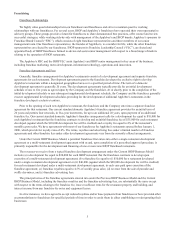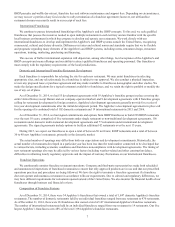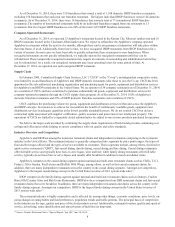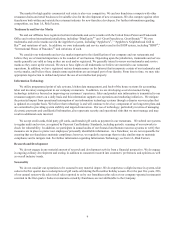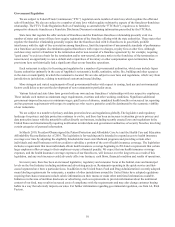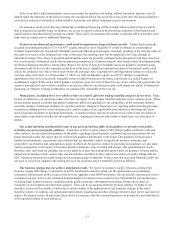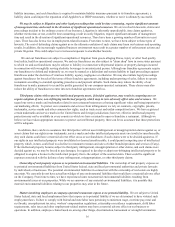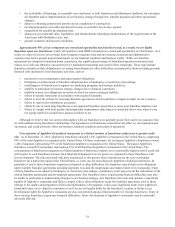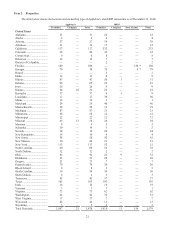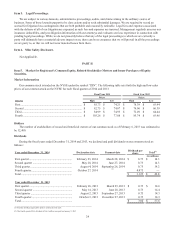IHOP 2014 Annual Report Download - page 34
Download and view the complete annual report
Please find page 34 of the 2014 IHOP annual report below. You can navigate through the pages in the report by either clicking on the pages listed below, or by using the keyword search tool below to find specific information within the annual report.15
A failure to develop and implement innovative marketing and guest relationship initiatives, ineffective or improper use
of social media or other marketing initiatives, and increased advertising and marketing costs, could adversely affect our
business results. If our competitors increase their spending on advertising and promotions, if our advertising, media or
marketing expenses increase, or if our advertising and promotions become less effective than those of our competitors, we
could experience a material adverse effect on our business results. A failure to sufficiently innovate, develop guest relationship
initiatives, or maintain adequate and effective advertising could inhibit our ability to maintain brand relevance and drive
increased sales.
As part of our marketing efforts, we rely on search engine marketing and social media platforms to attract and retain
guests. These efforts may not be successful, resulting in expenses incurred without the benefit of higher revenues or increased
employee engagement. In addition, a variety of risks are associated with the use of social media, including the improper
disclosure of proprietary information, negative comments about our brands, exposure of personally identifiable information,
fraud, or out-of-date information. The inappropriate use of social media vehicles by our franchisees, guests or employees could
increase our costs, lead to litigation or result in negative publicity that could damage our reputation. These efforts may not be
successful, and pose a variety of other risks, as discussed below under the heading: “We are heavily dependent on information
technology and any material failure of that technology could impair our ability to efficiently operate our business.”
Changing health or dietary preferences may cause consumers to avoid Applebee's and IHOP's products in favor of
alternative foods. The food service industry as a whole rests on consumer preferences and demographic trends at the local,
regional, national and international levels, and the impact on consumer eating habits of new information regarding diet,
nutrition and health. Our franchise development and system-wide sales depend on the sustained demand for our products,
which may be affected by factors we do not control. Various factors such as: (i) the Food and Drug Administration’s menu
labeling rules of nutritional content, (ii) nutritional guidelines issued by the United States Department of Agriculture and
issuance of similar guidelines or statistical information by state or local municipalities, or (iii) academic studies, may impact
consumer choice and cause consumers to select foods other than those that are offered by Applebee's or IHOP restaurants. We
may not be able to adequately adapt Applebee's or IHOP restaurants' menu offerings to keep pace with developments in
consumer preferences, which may result in reductions to the franchise payments we receive from franchisees and the revenues
generated by our company-operated restaurants.
We face a variety of risks associated with doing business with franchisees and vendors in foreign markets. Our
expansion into international markets could create risks to our brands and reputation. We believe that we have selected high-
caliber international franchisees with significant experience in restaurant operations. However, the ultimate success and quality
of any franchise restaurant rests with the franchisee. If the franchisee does not successfully operate its restaurants in a manner
consistent with our standards, or customers have negative experiences due to issues with food quality or operational execution,
our brand values could suffer, which could have an adverse effect on our business.
There is no assurance that our international operations will be profitable or that international growth will continue. Our
international operations are subject to all of the same risks associated with our domestic operations, as well as a number of
additional risks. These include, among other things, international economic and political conditions, foreign currency
fluctuations, and differing cultures and consumer preferences.
We also are subject to governmental regulations throughout the world that impact the way we do business with our
international franchisees and vendors. These include antitrust and tax requirements, import/export/customs regulations, anti-
boycott regulations, and other international trade regulations, the USA Patriot Act and the Foreign Corrupt Practices Act.
Failure to comply with any such legal requirements could subject us to monetary liabilities and other sanctions, which could
harm our business, results of operations and financial condition.
Factors outside our control may harm our brands' reputations. The success of our restaurant business is largely
dependent upon brand recognition and the strength of our franchise systems. The continued success of our franchisees and our
company-operated restaurants will be directly dependent upon the maintenance of a favorable public view of the Applebee's
and IHOP brands. Negative publicity (e.g., crime, scandal, litigation, on-site accidents and injuries or other harm to customers)
at a single Applebee's or IHOP location can have a substantial negative impact on the operations of all restaurants within the
Applebee's or IHOP system. Multi-unit food service businesses such as ours can be materially and adversely affected by
widespread negative publicity of any type, but particularly regarding food quality, food-borne illness, food tampering, obesity,
injury or other health concerns with respect to certain foods, whether or not accurate or valid. The risk of food-borne illness or
food tampering cannot be completely eliminated. Any outbreak of food-borne illness or other food-related incidents attributed
to Applebee's or IHOP restaurants or within the food service industry or any widespread negative publicity regarding the
Applebee's or IHOP brands or the restaurant industry in general could harm our reputation. Although the Company maintains


